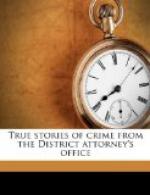“We very much regret being compelled to reverse this conviction. Even if the prosecutor intended to deal in counterfeit money, that is no reason why the appellant should go unwhipped of justice. We venture to suggest that it might be Well for the Legislature to alter the rule laid down in McCord vs. People.”
Well might the judges regret being compelled to set a rogue at liberty simply because he had been ingenious enough to invent a fraud (very likely with the assistance of a shyster lawyer) which involved the additional turpitude of seducing another into a criminal conspiracy. Livingston was turned loose upon the community in spite of the fact that he had swindled a man out of $500 because he had incidentally led the latter to believe that in return he was to receive counterfeit money or “green goods,” which might be put into circulation. Yet, because some years before, the Judges of the Court of Appeals had, in the McCord matter, adopted the rule followed in civil cases, to wit that as the complaining witness was himself in fault and did not come into court with clean hands he could have no standing before them, the Appellate Division in the next case felt obliged to follow them and to rule tantamount to saying that two wrongs could make a right and two knaves one honest man. It may seem a trifle unfair to put it in just this way, but when one realizes the iniquity of such a doctrine as applied to criminal cases, it is hard to speak softly. Thus the broad and general doctrine seemed to be established that so long as a thief could induce his victim to believe that it was to his advantage to enter into a dishonest transaction, he might defraud him to any extent in his power. Immediately there sprang into being hordes of swindlers, who, aided by adroit shyster lawyers, invented all sorts of schemes which involved some sort of dishonesty upon the part of the person to be defrauded. The “wire-tappers,” of whom “Larry” Summerfield was the Napoleon, the “gold-brick” and “green-goods” men, and the “sick engineers” flocked to New York, which, under the unwitting protection of the Court of Appeals, became a veritable Mecca for persons of their ilk.
To readers unfamiliar with the cast of mind of professional criminals it will be almost impossible to appreciate with what bold insouciance these vultures now hovered over the metropolitan barnyard. Had not the Court of Appeals itself recognized their profession? They had nothing to fear. The law was on their side. They walked the streets flaunting their immunity in the very face of the police. “Wire-tapping” became an industry, a legalized industry with which the authorities might interfere at their peril. Indeed, there is one instance in which a “wire-tapper” successfully prosecuted his victim (after he had trimmed him) upon a charge of grand larceny arising out of the same transaction. One crook bred another every time he made a victim, and the disease of crime, the most infectious of all distempers, ate its way unchecked into the body politic. Broadway was thronged by a prosperous gentry, the aristocracy and elite of knavery, who dressed resplendently, flourished like the green bay-tree, and spent their (or rather their victims’) money with the lavish hand of one of Dumas’s gentlemen.




